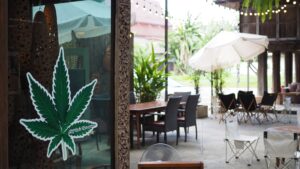In North Carolina, cannabis has undergone a tumultuous journey. Historically, the state has upheld stringent anti-marijuana policies, criminalizing even the possession of small quantities. However, as national sentiments on marijuana shifted, even the more conservative regions of the state began reconsidering their stance. This article will shed light on the recent developments within the Eastern Band of Cherokee Indians, highlighting their unique position in the cannabis debate.
Despite the broader wave of cannabis legalization across the U.S., North Carolina continues to criminalize the possession of marijuana. Yet, the Eastern Band of Cherokee Indians stands apart, showcasing the complexities of tribal sovereignty.
Who Are the Eastern Band of Cherokee Indians of North Carolina?
Before examining the complexities of cannabis legalization, it’s essential to understand the community at the heart of this narrative – the Eastern Band of Cherokee Indians.
Historical Roots
The Eastern Band of Cherokee Indians represents a distinct group of the Cherokee Nation, primarily based in North Carolina. Their ancestors resisted the infamous forced relocation known as the “Trail of Tears” in the 1830s. Instead of embarking on the perilous journey westward, they chose to remain in their ancestral lands, ensuring the legacy of the Cherokee persisted in the southeastern United States.
Territory and Governance
Today, the tribe resides within the Qualla Boundary – a 57,000-acre territory in western North Carolina. This land isn’t a reservation handed down by the government; it’s land bought and owned by the Cherokees themselves, making their sovereignty unique.
The Tribal Council, an elected body, governs the Eastern Band of Cherokee Indians. The council plays a pivotal role in shaping policies, laws, and economic decisions for the tribe. Coupled with this, the Principal Chief provides executive oversight, ensuring the tribe’s cultural, economic, and societal interests are represented and protected.
Cultural Significance
The Eastern Band of Cherokee Indians has undertaken significant efforts to preserve their rich cultural heritage. The Cherokee language, customs, arts, and traditional events remain a vibrant part of the community’s daily life. They are passionate custodians of their history, ensuring that future generations can connect with the stories, traditions, and values of their forefathers. Institutions like the Museum of the Cherokee Indian offer immersive experiences, capturing the essence of the Cherokee spirit and its evolution through the ages.
Economic Impact
Historically reliant on agriculture, the tribe has transitioned into diverse economic activities over the decades. From the booming tourism sector, thanks to attractions like Harrah’s Cherokee Casino Resort, to ventures into retail, healthcare, and now potentially the cannabis industry, the Eastern Band of Cherokee Indians continues to explore innovative avenues for growth and self-sustenance.
Tribal Referendum on Recreational Marijuana
Members of the Eastern Band of Cherokee Indians are set to cast their votes on a critical decision. Should their Tribal Council approve the recreational use of marijuana within their 57,000-acre reservation, the Qualla Boundary?
What the Referendum Entails
The core question of the referendum centers on two main points:
Legalizing the possession and consumption of marijuana for individuals aged 21 and over.
Mandating the Tribal Council to formulate legislation to oversee the cannabis market.
Council Chairman Richard French indicated that this vote stems from the council’s desire to understand the community’s inclination toward cannabis legalization.
Legal Status of Cannabis within the Reservation
The tribal council has already showcased a progressive stance on marijuana. In May 2021, they decriminalized the possession of small cannabis quantities, effectively making their reservation the sole region within North Carolina where marijuana is legal. Building on this, they proceeded to legitimize medicinal marijuana and began preparations for a tribe-run dispensary.
Economic Potential and Political Divisions
The tribe’s foray into the cannabis industry isn’t just about freedom of choice; there’s an undeniable economic angle. The industry promises significant financial returns, especially considering the wider state’s reluctance to push for legalization.
However, there’s a clear divide in opinions. Principal Chief Richard Sneed, despite being an advocate for medicinal use, expresses concerns about plunging headfirst into recreational sales. In contrast, French believes there’s considerable support for medicinal marijuana but remains uncertain about its recreational counterpart.
U.S. Rep. Chuck Edwards, whose district envelops the Qualla Boundary, voiced his opposition to recreational cannabis legalization through the Stop Pot Act. This act aims to curtail federal funds for tribes choosing to legalize recreational marijuana. He further expressed his apprehensions in the tribe’s newspaper, warning of potential criminal repercussions.
North Carolina’s Larger Cannabis Landscape
Statewide, there’s evident support for medicinal marijuana legalization, with a 73% approval rate among registered voters. However, this hasn’t translated into tangible legislative action. Kevin Caldwell of the Marijuana Policy Project commended the Eastern Band of Cherokee Indians for seizing the opportunity that the state largely ignored.
The Tribal Landscape and Cannabis
Nationally, the Eastern Band of Cherokee Indians isn’t the pioneer in tribal cannabis legalization. In 2020, the Oglala Sioux Tribe of South Dakota embraced recreational marijuana despite state-level restrictions. Several tribes, like the Suquamish Tribe and the Las Vegas Paiutes, have established their dispensaries.
Diversifying revenue streams is vital for many tribes. Traditionally relying on casino revenues, tribes now explore other industries. As Chief Sneed mentioned, the lucrative window of the cannabis industry might be closing swiftly. Yet, if they play their cards right, the Cherokee could monopolize the cannabis market in North Carolina.
Qualla Enterprises: Spearheading Tribal Cannabis Ventures
Qualla Enterprises stands at the forefront of the tribe’s cannabis endeavors. Operating 75 indoor cultivation facilities and gearing up to inaugurate a dispensary, the business seems primed to cater to the burgeoning demand. Their research suggests a requirement to produce 40,000-80,000 pounds of marijuana annually, contingent on the approval of recreational use.
Forrest Parker, the general manager of Qualla Enterprises, perceives this venture as more than just economic growth. It symbolizes hope, progress, and life-changing opportunities for tribal members.
Looking Forward
The Eastern Band of Cherokee Indians’ stance on cannabis legalization exemplifies the complexities surrounding marijuana laws in North Carolina and the broader U.S. Their decision could pave the way for broader acceptance or further highlight the deep-seated divisions within the state. Only time will tell.






